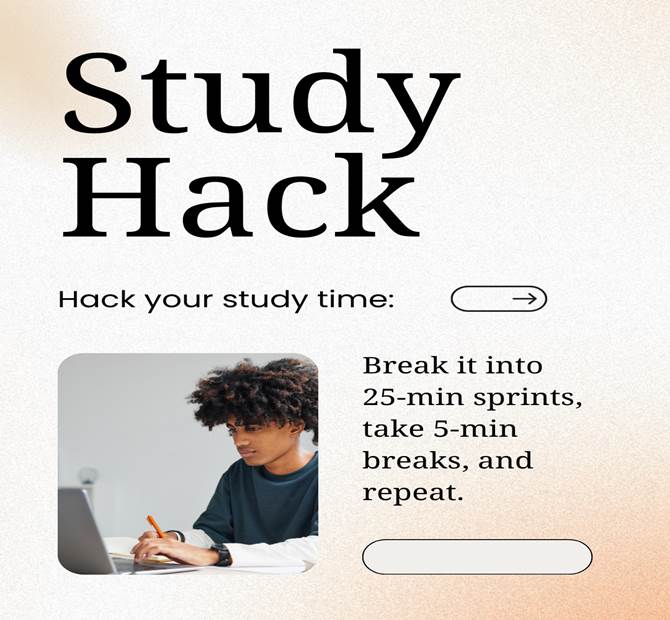University life can feel overwhelming at times. You are juggling between lectures, group work, assignments, part-time jobs, and relationships. You feel stretched too thin. Many at times, you have to pull an all-nighter before that urgent assignment deadline or an exam. You often find yourself staring at the same textbook page for long without absorbing a single concept you are trying to understand. Here’s the truth – many students face this struggle, every day!
There are too many distractions today. Unlike in the old days, today’s online space is bent on taking up as much of your attention as possible. You don’t need to fight the reality of reduced attention spans common in the current university settings.
You need a smarter work approach.
The good thing is that our professors have done the heavy lifting for you and they have come up with practical study hacks and tweaks to make your study sessions easier. Applying these small, evidence-based hacks to the way you learn can transform your productivity, improve understanding, and translate into improved performance in any course you are taking. Therefore, let’s jump right in and see how these can help you enjoy those study sessions.
Here are the 10 proven study hacks every university student should know. Each one is practical, backed by psychology and learning science, and easy to implement right away.
And here’s the kicker—by combining these strategies with expert support from tutors at Top Tutors , you’ll not only free up your schedule but also ensure you’re always ahead of the curve.
1. Master the Pomodoro Technique
Have you noticed that it is getting more difficult to focus on one thing for hours? Also, do you ever notice how easily you are distracted from what you are supposed to be doing? Apparently, this is common among students from all parts of the world. Truth be told, our brains aren’t designed for marathon study sessions. That’s why the Pomodoro Technique comes in handy. The technique helps you break down your study sessions into short, focused sprints:
- Lock in for 25 minutes of intense studying
- Take 5 minutes of rest after that
- After 4 rounds, you can take 20 – 30 minutes break to recharge

This approach ensures you cover any topics by absorbing smaller chunks of information with regular breaks for reflection.
This is why it works; Studies shows that the brain’s attention span peaks in 20–40 minutes. As such, short breaks prevent fatigue and keep you fresh for longer study periods.
Try this today - Using a Pomodoro timer app like Forest or Focus To-Do, track how much more you retain in just two hours compared to one long, distracted session.
2. Use Active Recall Instead of Rereading
You often find yourself reading and rereading one aspect for longer unstructured study sessions. This does not help – even when you stick at it for hours. In reality, learn the art of active recall—testing yourself without looking at the notes—is far more effective.
After reading a chapter today, close the page, book or tab and note down a summary of what you just learned. You can quiz yourself with flashcards (apps like Anki are great).
Students who practice active recall score 50% better on later exams than those who only reread. Therefore, take advantage of this technique and transform your study sessions today.

3. Leverage Spaced Repetition
We all resort to cramming especially when under exam fever or assignment deadline. Too bad, cramming only works for about 24 hours. If you are really interested in long-term memory retention, spaced repetition is a powerful tweak you can use.
The trick is to regularly review the learning material you want to digest. For example, you should revisit your learning material after 24 hours, 3 days, a week, or two weeks. You know yourself, so choose an interval that works for you.
Spaced repetition slows down forgetfulness and the good thing is apps like Anki, Khan- Academy, and Quizlet employ repetition algorithms to schedule reviews automatically.
4. Beat Procrastination with the Two-Minute Rule
Getting started is often the hardest part. Enter the Two-Minute Rule: If a task takes less than two minutes, do it now. For bigger tasks, commit to just two minutes of work.
The two-minute-rule creates momentum to keep you going. Often, once you begin, you’ll keep going far beyond two minutes.
Do this: Commit to reading a page or two every two to five minutes. Before you know it, you’ll soon be reading five pages and more. Try it!
5. Optimize Your Study Space

Your study aesthetic influences your focus more than you think. Remove any clutter to declutter your mental space. Seems hard? Here are quick tips for improving your study sessions;
- Keep your desk clear except for essentials.
- Use proper natural light (preferably).
- Keep your phone out of reach when studying
This hack works by fixing the physical clutter which may reduce your attention by distraction.
6. The Teach-Back Method
This one is from the old books. The best way of understanding a concept is to teach it to others. Try teaching complex concepts to a friend or mate after learning it. This will help you simplify and organize information in a way that is digestible. It exposes the gaps you need to focus on and assures long-term retention after mastering such concept.
Don’t worry if you have no one to teach. You can record your ‘lessons’ on your phone and go back to them as a student. Your voice will learn new information you didn’t think you had before!
7. Take Advantage of Visual Learning with Mind Maps
Many students prefer visuals for learning since it is the most common interface for deep understanding of concepts. Instead of linear notes, try mind maps: diagrams that connect concepts through branches and keywords.
Visualizing information helps your brain form associations, making recall easier.
Download and try digital apps like XMind or sketch them by hand for improved learning.
8. Block Out Digital Distractions
One of the biggest threats to productivity are the constant notifications which lead to the Fear of Missing Out (FOMO).
Make a decision to avoid using your phone for certain periods where you concentrate on studying. You can also hack your phone using apps like Freedom, Cold Turkey, or StayFocusd. These block distracting apps or websites during your study time.
This method works because it will save you substantial amounts of time used to get back into focus after distractions. Studies show it takes an average of 23 minutes to refocus after a distraction. Eliminating them can save you hours every day.
9. Sleep for 6-9 Hours Everyday
Many students think sacrificing sleep equals more study time. In reality, it doesn’t work always and sometimes it backfires.
Sleep consolidates memory. According to Harvard Medical School, students who sleep after learning remember 20–40% more than those who don’t.
Hack: Prioritize 7–9 hours of sleep and avoid all-nighters. You’ll retain more with fewer hours of effective study.
10. Reward Yourself to Stay Motivated
Productivity isn’t about discipline alone—it’s about motivation. Small rewards keep you going.
Examples:
- Finish a chapter? Treat yourself to a snack.
- Survive a tough week? Watch your favorite show guilt-free.
Why it works: Dopamine, the brain’s “reward chemical,” reinforces positive habits, making it easier to stick to routines.
Pulling It All Together
Each of these study hacks may seem small, but together they can transform your academic life. Imagine cutting your study time in half while remembering more. Imagine walking into exams confident instead of stressed.
The truth is, success isn’t about cramming harder—it’s about studying smarter.
But here’s the catch: Even with the best study hacks, deadlines pile up, and life happens. Sometimes you just need extra help.
That’s where we come in.
???? Need Extra Help?
At Top Urgent Essays our expert tutors and academic writers help you tackle tough assignments, essays, and projects so you can focus on what matters most—learning, growing, and living your life.
? Don’t let stress hold you back. Join thousands of students who’ve already boosted their grades and freed up time with our support.
???? Need extra help? Our tutors can save you time and stress — book a session today.
Final Thoughts
University can feel overwhelming, but it doesn’t have to. By applying these 10 proven study hacks, you’ll sharpen your productivity, master your time, and create balance in your academic journey. And when the workload gets too heavy, remember—you don’t have to do it alone.
Here’s to studying smarter, not harder.
